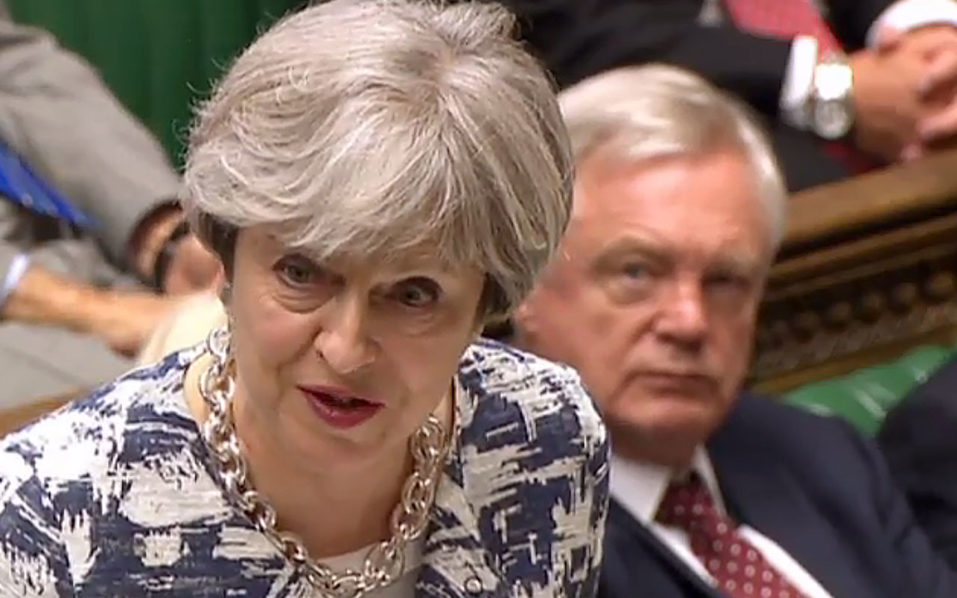
British Prime Minister Theresa May faced a backlash Monday after setting out proposals for the rights of EU nationals after Brexit that include new residency permit requirements and family reunion rules.
May promised to end the “anxiety” of 3.2 million European nationals but is on a collision course with Brussels after vowing that the European Court of Justice would not be allowed to protect their rights.
“I want to completely reassure people that under these plans no EU citizen currently in the UK lawfully will be asked to leave at the point the UK leaves the EU,” she told parliament.
“We want you to stay,” May said, after last year’s referendum to end Britain’s four-decade membership of the 28-nation bloc put the future of EU citizens in doubt.
But she was heckled as opposition lawmakers accused her of using Europeans as “bargaining chips” by refusing to guarantee their rights until a reciprocal deal was struck for around one million Britons living elsewhere in the EU.
Resolving the issue is an early priority for both sides of the Brexit talks that began last week, but also threatens to cause major rows between London and Brussels.
‘More ambition and clarity’
May received a cool reception when she set out the principles of her plan to European leaders at a summit on Thursday, with EU President Donald Tusk warning that it fell “below our expectations”.
And EU chief negotiator Michel Barnier said Monday that Britain needs to offer EU citizens living there “more ambition, clarity and guarantees” on their post-Brexit rights than it has proposed.
In a 17-page policy document published Monday, May set out her proposals for family dependents of EU citizens and a promise to exclude those convicted of serious crimes.
But the offer on allowing spouses from outside Britain to move to the country after Brexit falls short of what Brussels had called for.
“I believe it’s a generous offer,” she said, adding that it would provide “reassurance and certainty”.
But opposition Labour leader Jeremy Corbyn accused of her of proposing “too little, too late”, adding: “This is confirmation the government is prepared to use people as bargaining chips.”
“After a year of uncertainty for those directly affected, and two months after the EU made a more generous offer, it is likely to be seen at best as a belated step in the right direction,” said Jonathan Portes, senior fellow The UK in a Changing Europe programme.
‘Number of limitations’
The European Parliament’s Brexit coordinator Guy Verhofstadt welcomed May’s proposal to simplify residency application procedures but said there were “a number of limitations” in the proposals.
Verhofstadt warned that “any degradation of the rights linked to freedom of movement” before Britain leaves the EU would be contrary to EU law.
EU citizens are currently free to move around the bloc’s 28 countries but this right will end with Brexit, forcing those in Britain who remain to apply for a new immigration status.
New details on Monday say family members of EU nationals can apply for “special status”, but spouses joining their families in Britain after Brexit would be subject to the same rules as non-EU nationals coming to join British citizens, which include a minimum income threshold.
“Theresa May has brought more precision on family reunification, and it is not very good news for EU citizens,” said Dimitrios Giannoulopoulos, founder of the Britain in Europe think tank.
In another move likely to irk Brussels, officials confirmed that EU nationals would need some form of identity document.
The Joint Council for the Welfare of Immigrants, a campaign group, said the proposal that EU nationals who have already applied for permanent residence need to start the process again was “unnecessary”.
‘Settled status’
The government also unveiled plans to exclude “serious or persistent criminals, and those whom we consider a threat to the UK”.
European rules already allow member states to expel other EU citizens on security grounds, and between 4,000 and 5,000 EU prisoners were deported from Britain last year, according to the interior ministry.
May proposes that those with at least five years residency before a cut-off date will be eligible for “settled status”, granting them indefinite leave to remain with unrestricted access to healthcare, education, welfare and pensions.
Those who arrived less than five years before the cut-off date will be allowed to stay until they accrue the time necessary to apply for “settled status”.
[ad unit=2]
Europeans arriving after the date will have a grace period — likely two years — to seek a temporary permit to stay in Britain, but will also be able to work towards “settled status”.
But the government has declined to set the cut-off date, offering a two-year window starting from March 29 this year — when the formal Brexit began — and saying the matter is one for the negotiations with the EU.
It has also rejected a demand by Brussels that the European Court of Justice arbitrate in any disputes over the new arrangements — setting up a major row.



